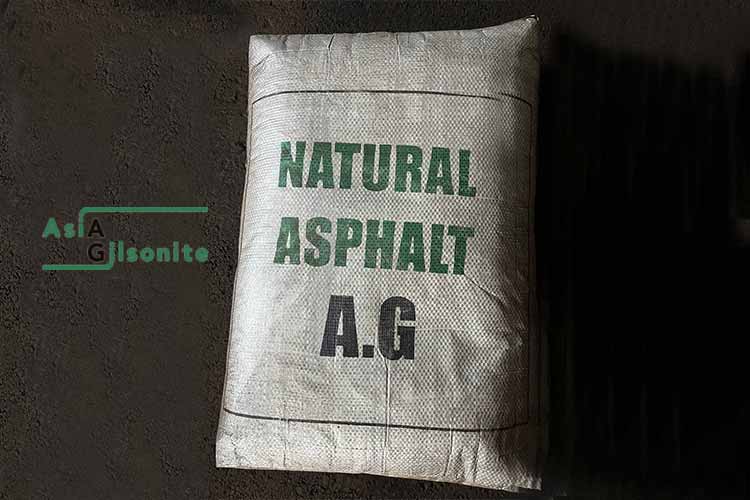Natural asphalt is found in natural deposits or is produced as a result of natural geological processes. It is a mixture of bitumen, mineral matter, and other organic materials, and it is widely used in the construction industry for road paving, roofing, and waterproofing. One of the main advantages of this type of asphalt is its durability and resistance to weathering and decay. It is highly elastic, which makes it ideal for use in high-traffic areas that are prone to wear and tear. Moreover, asphalt is strongly resistant to water and chemicals, which makes it an excellent choice for roofing and waterproofing applications.
In the following article, we’re going to explain what this asphalt is made of and how it’s created; we’re going to discuss the different types of this asphalt as well. So stay tuned.
What Is Asphalt Made of?
Natural asphalt is made of a complex mixture of hydrocarbons, which are organic compounds made up of hydrogen and carbon atoms. In other words, asphalt is a material made from crude oil and is mainly composed of bitumen, which is a sticky, black, and highly viscous liquid formed from the remains of ancient marine plants and animals. Bitumen contains a variety of compounds, including asphaltene, resin, and saturates, which contribute to its physical and chemical properties.
The deposits of natural asphalt are found in underground reservoirs or in surface deposits that have been exposed to air and water over time.
The composition of this asphalt can vary depending on the source, but it typically contains other substances such as water, sulfur, nitrogen, and trace amounts of metals such as nickel and vanadium. Asphalt can also contain small amounts of other hydrocarbons such as petroleum and natural gas.
It may be made of aggregates, such as sand, gravel, and crushed stone, which are mixed with the bitumen to create a strong and durable surface. The aggregates are mixed in varying proportions depending on the desired strength and durability of the asphalt. Additionally, additives like polymers and chemicals may be added to the asphalt mix to improve its properties, such as cracking and moisture resistance.
How Is Natural Asphalt Created?
in this part we will answer to the question”is asphalt a natural resource?
“Natural asphalt is created through the process of petroleum evaporation. Millions of years ago, crude oil seeped from the earth’s upper mantle and accumulated in underground reservoirs. Over time, the lighter components of the oil evaporated, leaving behind a thick, viscous residue known as asphalt. This process occurred slowly over thousands of years, as the reservoirs were subjected to intense heat and pressure, and it was usually associated with the formation of oil and gas deposits.
As the asphalt cooled and hardened, it became trapped in underground deposits, where it remains to this day. Some natural asphalt deposits are located close to the earth’s surface and can be mined using traditional techniques, while others are buried deep beneath the ground and require sophisticated drilling and extraction methods to access.
Types of natural asphalt
Asphalt falls under many different classifications, the main ones are discussed as follows:
Types of Natural Asphalt According to the Resource
According to the resources, asphalt comes in three types:
-
Lake Asphalt
Lake asphalt is the most commonly known type of natural asphalt. It is found in large quantities in Trinidad and Tobago and is also known as Trinidad asphalt. This type of natural asphalt is formed from the evaporation of seawater over thousands of years. Lake asphalt has high asphaltene and resin content and is used in the production of road pavement, roofing, and waterproofing.
-
Rock Asphalt
natural asphalt rock asphalt is formed from natural bitumen or asphaltite found in rock formations, mostly in the western part of the United States. It has low asphaltene and resin content and is therefore used in the production of asphalt cement, primarily for road surfacing and waterproofing.
-
Gilsonite
Gilsonite is a natural, solid hydrocarbon resource that is found in the Uinta Basin in Utah, USA. It has a high content of asphaltene and resin and is used in the production of various industrial products, including asphalt paving, adhesives, printing inks, and oil well drilling muds.
Types of Natural Asphalt According to Their Application
There are several types of natural asphalt, however, their application can be categorized into four groups:
-
Paving Asphalt:
Asphalt paving is one of the applications of Asphalt .This type of natural asphalt is generally used for paving roads, highways, and other asphalt surfaces. It is a durable material that can withstand heavy traffic and harsh weather conditions.
-
Roofing Asphalt:
Roofing asphalt is consumed for roofing applications. It is applied in layers to create a waterproof barrier that protects the building from decay and erosion.
-
Industrial Asphalt:
Industrial asphalt is utilized in a variety of industrial applications, such as sealing and coating products, waterproofing membranes, corrosion protection, and electrical insulation.
-
Mastic Asphalt:
The last type is widely used for flooring and lining applications. It has a smooth, non-slip surface, and is resistant to chemicals, weathering, and abrasion.
General Types of Natural Asphalt
Hot, cold, and protective natural asphalt are three common categories within the general types of natural asphalt.
-
Hot asphalt:
Another type of natural asphalt is called hot asphalt which is mainly used for paving roads, parking lots, and other applications that require a smooth, durable surface. It is heated to a high temperature before being applied, which makes it more workable and easier to spread.
-
Cold asphalt:
Cold asphalt is designed to be used at temperatures below 50°F. It is often used for small repairs or in areas where hot asphalt is not readily available. Cold asphalt is pre-mixed and does not require heating before being applied.
-
Protective asphalt:
As the name reveals, protective asphalt is utilized to protect a surface from damage caused by water or other elements. It contains added polymers that provide improved adhesion and elasticity, making it ideal for use in bridge decks, parking garages, and other structures that are exposed to harsh weather conditions.
Conclusion
To sum up, natural asphalt is a valuable resource found inasphalt deposits or created through geological processes. Its unique properties, such as durability, resistance to weathering and decay, and elasticity, make it an excellent material for use in road paving, roofing, and waterproofing applications. Asphalt is made up of bitumen and other organic materials, and its composition can vary depending on the source. The different types of asphalt, such as lake asphalt, rock asphalt, and gilsonite, have varying properties that make them suitable for specific applications such as paving, roofing, industrial use, and flooring.
Knowing the types and their properties can help professionals choose the right material for their project needs. As our understanding of asphalt continues to evolve, we may discover new ways to extract and process it more efficiently and sustainably.







